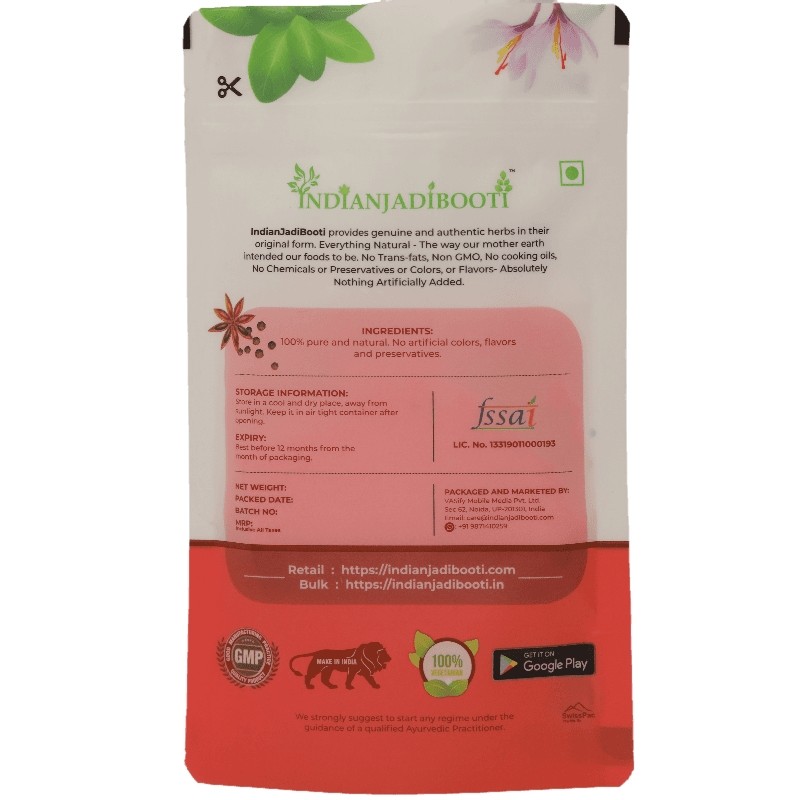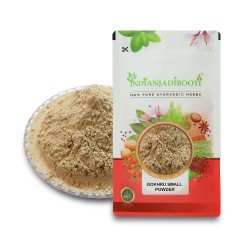















- Stock: In Stock
- SKU: HERB000446
- Shipping: Free within India upto 10KG
- Quality: Premium Herbs with No Adulteration
- Delivery: Within 3 to 7 Working Days in India
- Shipping: From Delhi based Facility
- Transport Charges for 25KG and above: Extra on To Pay
- COD Available: Max Limit: 2 Kg and Rs 3500 per order
- Discount on Prepaid Orders: Rs 50/- off. Auto Apply on Checkout.
Available Options
Description
Dry Parijat, also known as night-flowering Jasmine, is an important plant used in traditional medicines for the treatment of various diseases. The plant is used as an herbal remedy for treating various infectious and non-infectious diseases. Traditionally, different parts of the plant have been used as herbal remedies for treating conditions like intermittent fevers, arthritis, and sciatica. The plant shows anti-inflammatory and antipyretic (fever-reducing) properties, which help in managing pain and fever. It is also used as a laxative, in rheumatism, skin ailments, and as a sedative. Some researchers suggest its use on the hair scalp to relieve hair fall. The leaves of the plant can be used to treat ringworm and other skin diseases. According to Ayurveda, the paste of the Parijat plant leaves, when applied externally, can provide benefits in reducing the pain caused by an imbalance of Vata dosha due to its Vata-balancing property.
Arthritis:
Parijat or Harsingar leaves are effective herbal remedies for reducing painful conditions like osteoarthritis. As per Ayurveda, osteoarthritis is known as Sandhivata and it occurs due to an aggravation of Vata dosha. It causes pain, swelling, and joint mobility. Taking Parijat leaf powder helps to balance the aggravated Vata and reduces the symptoms of arthritis because of its Vata-balancing property.
Tip:
Take Parijat leaf juice 10-20ml or as directed by the physician.
Mix it with the same amount of water and have it before meals in the morning.
To get quick relief from arthritis pain.
Sciatica:
Ayurveda describes sciatica as Gridhrasi, and it is caused by the aggravation of Vata. Sometimes aggravated Kapha and Vata can also cause sciatica. Parijat has a Ushna (hot) nature that helps to bring back the aggravated Vata. It also helps to restore the state of equilibrium by maintaining the balance between Kapha and Vata dosha to provide relief in symptoms of sciatica.
Tip
Take Parijat leaf juice 10-20ml or as directed by the physician.
Mix it with the same amount of water and have it before meals in the morning.
To get quick relief from sciatica pain.
Fever:
Parijat or Harsingar can prove to be beneficial in controlling the fever. As per Ayurveda, the accumulation of ama (toxic remains in the body due to improper digestion) in the body may sometimes cause fever. Taking Parijat leaf juice with honey helps to reduce the symptoms of fever by reducing Ama because of its Ushna (hot) properties.
Tip:
Take a bowl and mix two leaves of Parijat plant, neem, three black peppers, and four leaves of tulsi.
Ground the mix in half a liter of water.
Now boil it till half a cup of residue remains.
Keep the concoction aside and let it cool down.
The remedy is ready to be given orally once or twice a day.
Indigestion:
According to Ayurveda, indigestion is termed Agnimandya. It occurs due to an imbalance of Pitta dosha. Whenever the ingested food is left undigested due to Mand Agni (low digestive fire), it results in the formation of ama (toxic remains in the body due to improper digestion) and causes indigestion. Parijat helps enhance the Agni, thus leading to improved digestion due to its Deepan (appetizer) and Pachan (digestion) properties.
Tip
Take Parijat leaf powder 1-3 gm or as directed by the physician.
Mix it with honey and have it after meals once or twice a day.
To get relief from indigestion
Diabetes:
Diabetes, also known as Madhumeha, occurs due to an aggravation of Vata-Kapha dosha as well as impaired digestion. Impaired digestion leads to an accumulation of ama (toxic remains in the body due to improper digestion) in the pancreatic cells and impairs the function of insulin. Parijat helps manage diabetes due to its Vata-Kapha balancing and Tikta (bitter) properties. It helps prevent the accumulation of Ama and improves the function of insulin, thereby managing blood sugar levels and reducing the symptoms of diabetes.
Tip
Take Parijat leaf powder 1-3 gm or as directed by the physician.
Mix it with lukewarm water and have it once or twice a day
To manage symptoms of diabetes
Joint pain:
Parijat oil can help to reduce bone and joint pain. According to Ayurveda, bones and joints are considered sites of Vata in the body. Pain in the joints is mainly caused by an imbalanced Vata. Applying Parijat oil helps to reduce joint pain due to its Vata-balancing property.
Tip
Take 5-10 drops of Parijat essential oil.
Mix with coconut oil and apply on the affected area once or twice a day to get relief from joint pain.
Hair fall:
Parijat has Keshya (hair tonic) property, which helps to control hair fall and promote hair growth. Juice of Parijat flower or paste of the seeds, when applied to the scalp, can give quick results and also promote hair growth.
Tip
Extract the juice of Parijat flowers or make a paste out of the seeds
Apply it to the scalp.
Leave it for 20 to 30 minutes, then wash it with plain water.
Repeat the process twice a week to get quick results.
Ringworm:
Ringworm or Dadru with itching and burning sensation is due to an imbalance of Kapha and Pitta dosha. Parijat leaf juice helps to control fungal infections and itching associated with ringworm. This is due to its Kushtghna (useful in skin disease) and Kapha pacifying properties.
Tip
Take Parijat flower or leaf juice in 10–20 ml or as per requirement.
Apply it to the affected area.
Leave it 20 to 30 minutes, then wash with plain water.
Repeat the process twice a week to get quick relief from ringworm lesions.
Other Names: Sheoli, Singhar, Shephalika, Night Jasmine, Night -flowering Jasmine, Jasmin de nuit, Trauerbaum, Nachtjasmin, Harshangar, Haar, Harsinghar, Harsingar, Parijat, Nyctanthes arbor-tristis Linn, Partak, Khurasali, Parijatak, Gulkamah, Kuri, Laduri, Pakar, Parijataka, Parijata, Sephalika, Rajanikasa, Harshringar , Harsinghar, Paarijaat, Parijat, Night Jasmine, Prajakta, Harshringhar, Night Jasmine, Coral Jasmine, Harisingar, Harisinghar, Haar Shringaar, Siuli, Shiuli
Harshingar Flower , Nyctanthes arbor,tristis, Harshinger, Harsingar, Parijat, Paarijaat Phool, Parijat Flower, Harshringar Phool, Har Singar, Harsringar, Paarijat, Parijaat, Harsinghar, harshingar phool, Har Shingar, Harsingaar harshringar flower paarijaat, Harshringhar, Night Jasmine, Coral Jasmine, Harisingar, Harisinghar, Haar Shringaar, Siuli, Shiuli, Harsinghaar, Parijatham, Parijath
Reviews
100% Customers recommend this product
-
5 Awesome100%
-
4 Great0%
-
3 Average0%
-
2 Bad0%
-
1 Poor0%
Reviews Over Dry Parijat (Flower) - Harshringar (Phool) - Nyctanthes Arbor - Tristis (Flower) - Dried Harsingar - Night Jasmine - Coral Jasmine by IndianJadiBooti
- (5)
Total Reviews (1)
click here write review to add review for this product.
-
(5)
-
(5)
-
(5)
-
(5)
-
(5)
Report this review.

What is Harsingar Flower

-
Harshingar is a small, woody shrub or tree that grows up to 10 meters in height. The flowers are white with an orange-red center and bloom at night, hence the name "Night-flowering Jasmine." The flowers usually fall to the ground in the early morning, creating a carpet of delicate blooms.
Harshingar, also known as Night-flowering Jasmine or Parijat, is a revered plant in Ayurveda and traditional Indian medicine.
Anti-inflammatory: Harshingar reduce inflammation, helping manage joint pains
Antioxidant: They are rich in antioxidants, which protect against oxidative stress and chronic diseases.
Anthelmintic: The leaves can eliminate parasitic worms, promoting better digestive health.
-
Liver Protection: Harshingar leaves help protect the liver from damage caused by toxins and diseases.
Health Benefits of Harsingar Flower

Antimicrobial Activity
Parija Flowers possess strong antimicrobial properties, making them effective against a variety of bacteria and fungi. This can be beneficial for treating infections, promoting wound healing, and preventing the growth of harmful microorganisms. Read More

Antipyretic (Body Temperature-Reducing) Effect
Night Jasmine Flowers are traditionally used to reduce body temperature, particularly in cases of malaria and other febrile illnesses. Harshingar flowers can help lower body temperature and alleviate associated symptoms.

Digestive Health
The flowers are used to support digestive health by relieving constipation, bloating, and indigestion. They aid in the smooth functioning of the digestive system, promoting better digestion and overall gut health.

Respiratory Support
Harshingar Flowers are known for their expectorant properties, which help clear mucus from the respiratory tract. This makes them useful in treating respiratory issues like coughs, colds, and bronchitis, providing relief and improving breathing.
How to Use Harsingar Flower

Decoction for Anti-inflammatory and Body Temperature-Reducing Benefits
Wash the leaves thoroughly.
Boil the leaves in 2 cups of water until the quantity reduces to half.
Consume this decoction 1-2 times daily to help reduce inflammation, relieve joint pain, and lower body temperature.

Paste for Topical Application
Crush fresh Harshingar leaves to make a fine paste.
Add a few drops of water if needed to achieve the desired consistency.
Apply the paste directly to affected areas such as joints pain or wounds to prevent infections.

Anti-inflammatory Properties
Relieves Joint pain
Harshingar leaves are highly valued for their potent anti-inflammatory effects. They contain bioactive compounds like flavonoids and glycosides, which help reduce inflammation in the body. This makes the leaves particularly effective in managing conditions like joint pain, muscle pain, and other inflammatory disorders. By lowering inflammation, Harshingar leaves can alleviate pain, swelling, and discomfort, offering a natural remedy for chronic inflammatory conditions.

Infusion for Digestive and Respiratory Health
Dry the leaves in the shade until they become crisp.
Grind the dried leaves into a fine powder & Store in an airtight container.
Take 1 teaspoon of the powder mixed with warm water or honey once daily to support liver health.
FAQ
Parijat is utilized in Ayurveda for a variety of purposes. It helps in addressing digestive issues, arthritis, fever, enhancing liver function, alleviating menstrual pain, and has anti-inflammatory benefits. How is Parijat incorporated into Ayurvedic treatments? The leaves, flowers, and seeds of Parijat are employed in Ayurvedic formulations.
The aromatic blossoms of the Parijat tree offer numerous advantages for both mental and physical well-being. In traditional medicine, these flowers are utilized to address various ailments, serving as a natural remedy for both contagious and non-contagious conditions. The flowers possess diuretic, antioxidant, and anti-inflammatory qualities, and are also employed as calming agents.
The foliage of the plant is effective in treating ringworm and various skin conditions. In Ayurvedic medicine, applying a poultice made from Parijat plant leaves externally is believed to alleviate discomfort caused by Vata dosha imbalance, due to the plant's ability to regulate Vata.
Parijat is renowned for its potent fever-reducing properties. It effectively treats various types of severe fevers, including those caused by malaria, dengue, and chikungunya. Recent research indicates that extracts from Parijat leaves and bark can swiftly alleviate fever symptoms. Additionally, it has been shown to boost platelet counts in patients suffering from dengue and chikungunya fevers.
In Ayurvedic medicine, various parts of the Parijat plant are utilized for their medicinal properties. The plant's leaves, flowers, and seeds are incorporated into different Ayurvedic formulations. These components can be prepared as teas, concentrated liquid extracts, or steeped mixtures. Such preparations are believed to support digestive health, help reduce inflammation, and alleviate menstrual discomfort.
In Bengali and Assamese traditions, the blossoms of the parijat tree are referred to as 'Shefali phool'. These blooms are edible and can be consumed after frying. Despite their bitter taste, eating these flowers is believed to offer health benefits and can help alleviate various health issues. The consumption of these flowers is thought to possess curative properties, providing relief from different ailments.
















